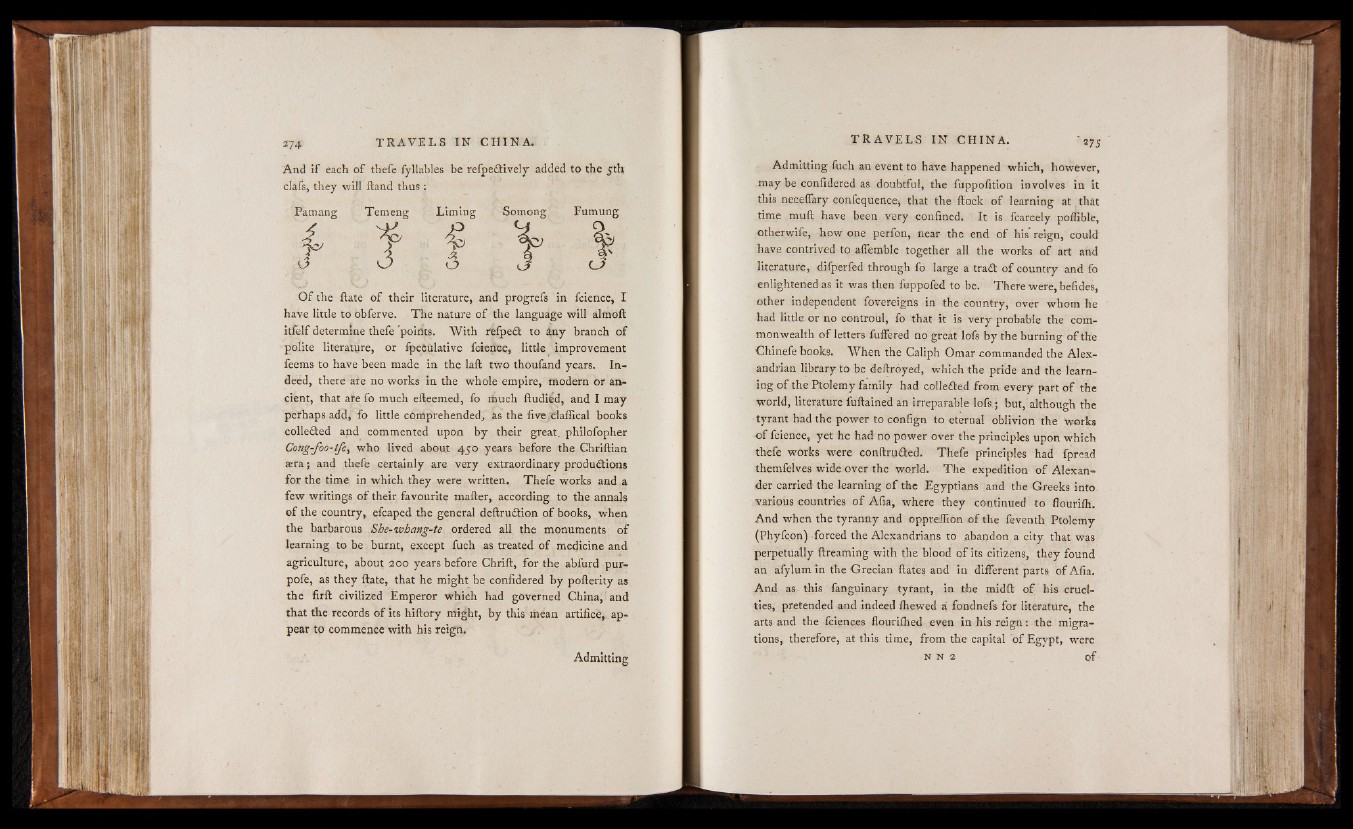
A n d i f each o f thefe fyllables be refpedtively added to the 5th
clafs, they will ftand thus :
Pamang Temeng Liming Somong Fumung
O f the ftate o f their literature, and progrefs in fcience, I
have little to obferve. The nature o f the language will almoft
itfelf determine thefe points. With fefpedt to any branch o f
polite literature, or fpetulative fcience, little improvement
feems to have been made in the laft two thoufand years. Indeed,
there ate no works in the whole empire, modern or ancient,
that ate fo much efteemed, fo ihuch ftudied, and I may
perhaps add, fo little comprehended, as the five ciafiical books
colle£ted and commented upon by their great, philofopher
Cong-foo-tfe, who lived about 450 years before the Chriftian
seta; and thefe certainly are very extraordinary productions
for the time in which they were written. Thefe works and a
few writings o f their favourite mailer, according to the annals
o f the country, efcaped the general deftruCtion o f books, when
the barbarous Sbe-wbang-te ordered all the monuments o f
learning to be burnt, except fuch as treated o f medicine and
agriculture, about 200 years before Chrift, for the abfurd pur-
pofe, as they ftate, that he might be confidered by pofterity as
the firft civilized Emperor which had governed China, and
that the records o f its hiftory might, by this mean artifice, appear
tp commence with his reign.
Admitting
Admitting fuch an event to have happened which, however,
may be confidered as doubtful, the fuppofition involves in it
this neceffary confequence, that the ftock o f learning at that
time mull have been very confined. It is fcarcely poffible,
otherwife, how one perfon, near the end o f his reign, could
have contrived to affemble together all the works o f art and
literature,, difperfed through fo large a trad o f country and fo
enlightened as it was then fuppofed to be. There were, befides,
other independent fovereigns in the country, over whom he
had little or no controul, fo that it is very probable the commonwealth
o f letters fuffered no great lofs by the burning o f the
Chinefe books. When the Caliph Omar commanded the Alexandrian
library to be deftroyed, which the pride and the learning
o f the Ptolemy family had colleded from every part o f the
world, literature fuftained an irreparable lofs.; but, although the
tyrant had the power to confign to eternal oblivion the Works
o f fcience, yet he had no power over the principles upon which
thefe works were conftruded. Thefe principles had fpread
themfelves wide over the world. The expedition o f Alexander
carried the learning o f the Egyptians and the Greeks into
various countries o f Afia, where they continued to flouriih.
And when the tyranny and oppreffion o f the feventh Ptolemy
(Phyfcon) forced the Alexandrians to .abandon a city that was
perpetually ftreaming with the blood o f its citizens, they found
an afylum in the Grecian ftates and in different parts o f Afia.
And as this fanguinary tyrant, in the midft o f his cruelties,
pretended and indeed ihewed a fondnefs for literature, the
arts and the fciences flouriihed even in his re ign : the migrations,
therefore, at this time, from the capital o f Egypt, were
N N 2 o f